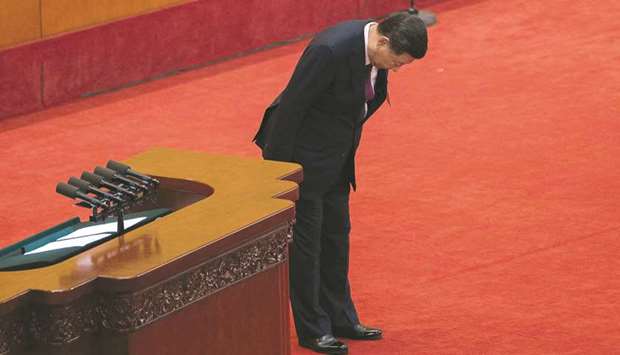Xi told some 2,300 delegates at the imposing Great Hall of the People that the party must “resolutely oppose” any actions that undermine its leadership as it steers a course through a high-stakes period in its development.
“The situation both domestic and abroad is undergoing profound and complex changes,” said Xi, who is expected to secure a second five-year term as general secretary and stack leadership positions with loyalists during the twice-a-decade congress.
“China’s development is still in a stage of important strategic opportunities. The prospects are bright, but the challenges are also severe,” he said in a marathon speech that exceeded three hours and was met by waves of applause. “Socialism with Chinese characteristics has entered a new era,” he said, envisioning a “great modern socialist country” by mid-century.
Speaking in front of a massive hammer and sickle, Xi touted his nationalistic “China dream” slogan, vowed to open the economy, promised to win the fight against poverty, and pointedly warned he would continue his “zero tolerance” campaign against corruption.
Considered China’s most powerful leader since Deng Xiaoping or even Mao Zedong, Xi could use the congress to lay the foundation to stay atop the 89-mn-strong party even longer than the normal 10 years, according to analysts. That would break the unwritten two-term limit accepted by his immediate predecessors Jiang Zemin and Hu Jintao – who were by Xi’s side at the congress – and end the era of “collective leadership” aimed at preventing the emergence of another Mao.
Another signal of Xi’s rise to the pantheon of Chinese leadership would be if his name is added to the party constitution, an honour that has only been bestowed upon modern China’s founder, Mao, and the father of economic reforms, Deng. “I want to sum up Xi’s speech in one sentence: It is the political declaration of the Xi era,” Chinese politics scholar Chen Daoyin told AFP.
“It is different from Mao’s era and Deng’s reform and opening era... Now we have entered an era of becoming strong.” Xi’s rise has been marked by a relentless crackdown on dissent, with authorities even refusing to free Nobel peace prize laureate Liu Xiaobo as he lay dying of cancer in July.
Potential rivals have also been swept aside under Xi’s vast anti-corruption drive, which punished 1.3mn Communist Party officials over five years. Xi said the campaign has been “unswervingly fighting against ‘tigers’, ‘beating flies’, ‘hunting foxes’” – terms used for lower- and higher-ranking officials and fugitives.
On other fronts, Xi touted efforts to complete the army’s modernisation by 2035 and build artificial islands in the disputed South China Sea.
In a stern warning to self-ruled Taiwan, he said China has the “ability to defeat separatist attempts for Taiwan independence in any form”. Xi, who has championed globalisation in the face of President Donald Trump’s “America First” policies, vowed to further open up China’s economy. Foreign companies complain that Xi’s words have not been backed by deeds, as the state retains control over the economy.
Trump, who will visit Beijing next month, has launched a trade investigation into China’s intellectual property practises.
“China will not close its doors to the world, we will only become more and more open,” Xi said. Authorities stepped up policing for the week-long congress, with red armband-wearing “security volunteers” fanning out across the capital, karaoke bars closing and knife sales restricted. Chinese tech companies restricted social media users from changing their profile pictures and names, while positive messages dominated Twitter-like Weibo and photos circulated of children watching the speech in classrooms.

